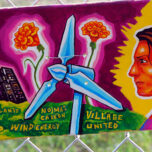These problems aren’t easily fixed; getting the attention of marginalized groups can be difficult due to a range of issues. Lack of time and resources (both from the marginalized and the environmental groups), a disinterest brought about by feeling separate from the issues, or prioritization of other issues that demand time and effort all contribute to this difficulty. But the environment is a constant in our — everyone’s — daily lives. Environmental groups need to more proactively promote a sustained connection with nature for all people. That, at least, would be a start. As a Hispanic individual who grew up in a Spanish-speaking environment, I see disseminating information in multiple languages as one way to engage a broader audience (and this needs to be done at a community level, rather than hoping people stumble upon Spanish materials posted online).
I don’t believe I have all of the solutions, but I know that when I look around, I see an environmental movement losing relevance in my world.
My generation, known by many for its self-absorption, may not have the means to monetarily support environmental organizations, but we are innovative, and we love to share ideas and feel like we have a cause and purpose in the world (as long as someone’s listening and taking notice). I don’t believe I have all of the solutions, but I know that when I look around, I see an environmental movement losing relevance in my world as a young, low-income person of color. Environmental problems are humanity’s problems. The movement to address those problems needs to find a way to make everyone see that.
Today, staying relevant means engaging with the broadest group of voices possible. Republicans learned that lesson in the latest presidential election, noting that both women and voters of color are going to be key to winning elections moving forward. The environmental movement needs to learn this lesson much faster than it seems to be — to not only save itself but the environment, too. In a world where issues such as gun control, education, LGBTQ rights and much more have nudged their way into the American psyche and national conversation, the environmental movement needs to do the same. As the Rio Declaration stated two decades ago, “Environmental issues are best handled with participation of all concerned citizens.” Making this a priority is the only real path toward creating the widespread movement that we need today. Anything less, and we’ll see a movement soon stifled and insignificant, failing at all it set out to accomplish. ![]()
Editor’s note: The views expressed here are those of the author and not necessarily of Ensia. We present them to further discussion around important topics. We encourage you to respond with a comment below, following our commenting guidelines, which can be found here. In addition, you might consider submitting a Voices piece of your own. See Ensia’s “Contact” page for submission guidelines.
UPDATED 07.03.13: The first paragraph of this article originally attributed a quote from a Grist magazine article to Michael Shellenberger and Ted Nordhaus’ essay “The Death of Environmentalism.” The article has since been updated to include a quote from their essay instead.
Related Posts
Ensia shares solutions-focused stories free of charge through our online magazine and partner media. That means audiences around the world have ready access to stories that can — and do — help them shape a better future. If you value our work, please show your support today.
Yes, I'll support Ensia!




I recently went to a workshop at the U for the Twin Cities Women in Sustainability - and the speakers showcased the various programs at the U working on Sustainability - a large number of which were outside of the U.S. While I'm not against helping people in other countries, we have significant enough issues here that are not being adequately addressed.
Take, for instance, the vast food deserts in North Minneapolis. Coalitions of local residents there are now being built to support creation of sustainable food systems but it would seem the U could do more.
I am working to bring voices together from all backgrounds and would love to talk with you about how to engage those that have so far been mostly outside the conversation. I'm building a platform for local online engagement at SustainingCommunity.org.
Now let's unpack this statement.
This means from a young age, teaching kids about the nature in their everyday world. Heard of nature deficit disorder? To combat NDD, we must move kids away from the technology and teach them about their local flora & fauna. Nature should not be on a placed on a pedestal. It can exist both on as a street tree & in the Adirondacks.
But I digress.
Other solutions include programs spearheaded by big organizations like The Nature Conservancy's LEAF program or creating diverse conversations through social communities like http://www.outdoorafro.com/.
What we need to really do is reinvent the idea of what it means to be an environmentalist. Do you like the world around you, like clean water or nice air to breathe? Then yes, you are an environmentalist.
Karlie, the U can certainly do more to make these links. There are programs that didn't get called out in the workshop you attended: HECUA, the Urban Research and Outreach Center and the District Alliance have ties to Minneapolis neighorhoods and may be interested in your new online engagement platform.
We no longer talk about just defending nature or preserving something. We talk about a holistic vision for the new, sustainable society. Environmentalists are still there, but only a part of the picture. http://ufbutv.com/2012/08/23/the-sustainable-society-of-2040/
I see the world's ecology from an ecocommerce perspective; one which ecology and economy are integrated. I'm logical and cannot see a solution that does not tap into the symbiosis of nature and the self-interests of people.
I am not an environmentalist. I am an ecocommercist.
I agree with much of what Ann Marie writes and lately have warned the groups I work with that having more participants qualified for SS than not is not a healthy mix.
But the Atlantic Chapter (New York) Sierra Club actually has a dominance of female leadership as do most of its groups.
With any large organization that grew from grass roots the Sierra has developed into a gigantic bureaucracy that is forced to work within large frameworks that do deny being sensitive to finer points of subtlety and special categories but the challenges are generally even larger frameworks.
I think the young often seek more immediate action and relief than reality can provide. But they often form splinter groups to satisfy the need for quicker action and energy gets squandered and the effort eventually abandoned.
Nearly all environmental effort is derived from a love of nature. We nearly all pay special attention to one aspect more than others. Mine is Water.
So the young with energy share a love of special areas with we the old. We must find a way to bridge the gap and harness the energy before it gets dissipated.
And hopefully on Ensia down the road.
Plastic Pollution is considered one of the largest environmental threats to all people and animals and we need to educate the next generation of leaders about how they can be the solution to the issue of plastic pollution:
http://onemoregeneration.org/educational-program-info/